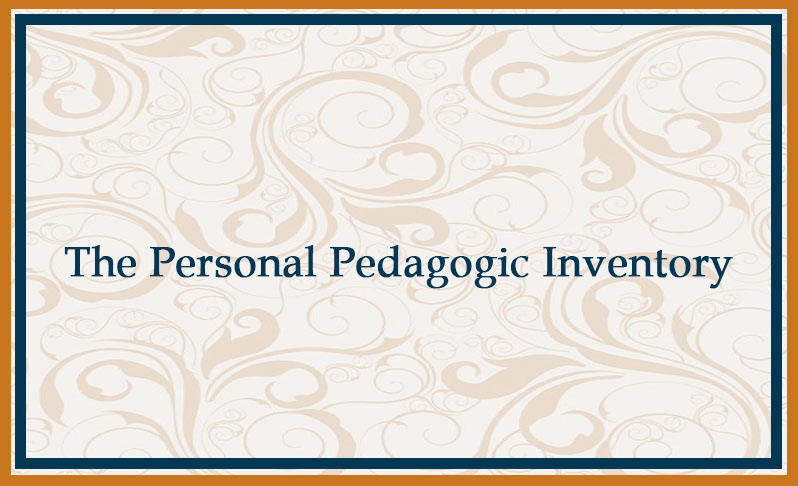Like a lot of other Centers for Teaching and Learning (CTLs), we remain convinced that today’s faculty do not receive the necessary pedagogic training in graduate school and thus professional development is necessary. However, since we live in evidence-driven times, how do we prove our hypothesis? While we have yet to perform a national study, we have started assessing our own faculty to check the validity of our theory.
Creating the Personal Pedagogic Inventory
We started by creating the Personal Pedagogic Inventory (PPI), a short questionnaire on faculty graduate school experience and general knowledge of materials central to professional development. We then started sending the questionnaire out to all new hires during the summer before they attend New Faculty Orientation. In earlier times we simply asked the new faculty during orientation the first nine questions found on the PPI by having them stand before question 1 and sit if they answered no to a question. In all the times we tried the oral PPI, the best we ever discovered was about four years ago when after question nine we had only Karen standing.
To devise the PPI, we tried to analyze the typical grad school experience as well as a general knowledge we thought should accrue from graduate training. Interestingly, at some of our New Faculty Orientations we have part-time instructors who have been given jobs in the tenure track, and we discovered no noticeable improvement in their scores compared to recent grad school hires on the PPI.
Notice that the PPI is really divided into two sections. Education and Knowledge and Understanding constitute background, while Pedagogical Practices refers to actual application of previous experience and study.
Take the PPI and see where you as a faculty developer (or teacher) stand. Feel free to use it or adapt it for your campus, perhaps just using a section of it, and let us know what you discover.
The Personal Pedagogic Inventory
EDUCATION
- In graduate school, did you take a course in pedagogy? (Yes, No)
- In graduate school were you part of a supervised teaching program? (Yes, No)
- Have you ever attended/presented at a non-disciplinary teaching conference? (Yes, No)
KNOWLEDGE AND UNDERSTANDING
- Can you list in ascending order the six levels of intellectual skills on the 2001 Revised Bloom’s Taxonomy? (Yes, No)
- Can you list the four types of scholarship enumerated by Boyer in Scholarship Reconsidered (1990)? (Yes, No)
- Do you understand what Cohen, Fink, and others call “instructional alignment?” (Yes, No)
- Until 1990 or so, the main instructional paradigm in higher education was the Sage on the Stage/Lecture method. Do you know what the current paradigm is? (Yes, No)
- Do you understand what is meant by the assessment concept of “closing the loop”? (Yes, No)
PEDAGOGICAL PRACTICES: as you prepare your syllabus, have you built in . . .10.
10. A daily reading quiz/reader response? (Yes, No)
- A collective 40 pages of researched writing? (Yes, No)
- An introduction to the importance and use of metacognitive strategies? (Yes, No)
- An organizational strategy that ensures organized classes? (Yes, No)
- Experiences that foster deep learning? (Yes, No)
- Experiences that move students into Bloom’s higher-order thinking skills? (Yes, No)
Discussion
We are the first to admit that the questions chosen constitute our apprehension of the graduate school experience, but since Rusty is a relatively recent graduate and Hal and Charlie received their degrees in the 20th Century, we think the PPI constitutes a good cross-section. Truthfully, though, when the three of us took the PPI, we found ourselves unprepared. Of course, the recent dates on some of the material suggest how recent faculty development, especially pedagogy, really is.
And we did find one other use for the PPI that made its creation totally worthwhile. A few years ago we found ourselves in a meeting of the Deans’ Council trying to convince them about the importance of faculty development and the need to fund the program. Unfortunately, most of the deans were skeptical their faculty could benefit from such development. On the spur of the moment, we pulled out the PPI and asked the room of deans to take it. They looked it over individually, wrote nothing down, and suddenly decided that pedagogy was an area in which everyone needed development.
Author
 Charlie Sweet is currently Co-Director of the Teaching & Learning Center (2007+) at Eastern Kentucky University. Before going over to the dark side of administration, for 37 years he taught American Lit and Creative Writing in EKU’s Department of English & Theatre, where he also served as chair (2003-2006). Collabo-writing with Hal Blythe, he has published well over 1000 items, including 15 books; of his 11 books with New Forums. Meet Charlie.
Charlie Sweet is currently Co-Director of the Teaching & Learning Center (2007+) at Eastern Kentucky University. Before going over to the dark side of administration, for 37 years he taught American Lit and Creative Writing in EKU’s Department of English & Theatre, where he also served as chair (2003-2006). Collabo-writing with Hal Blythe, he has published well over 1000 items, including 15 books; of his 11 books with New Forums. Meet Charlie.



